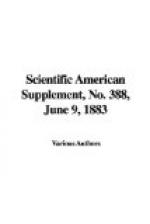As regards the head-covering of women, the fashions have been for several years favorable to proper form. The bonnet and hat have become quite small, and cover but little of the head. This beneficial condition, however, is in part counterbalanced by the weight of false curls, switches, puffs, etc., by the aid of which women dress the head. These, by interfering with evaporation of the secretions, prevent proper regulations of the temperature of the scalp, and likewise lead to the retention of a certain amount of excrementitious matter, both of which are prolific sources of rapid thinning and loss of hair in women.
False hair has likewise sometimes been the means of introducing parasites, which give rise to obstinate affections of the scalp.
Cleanliness of the entire surface of the skin should next demand attention, and that should be done by using water as the medium of ablution. It is a well-known physiological law that it is necessary, in order to enable the skin to carry on its healthful action, to have washed off with water the constant cast of scales which become mingled with the unctuous and saline products, together with particles of dirt which coat over the pores, and thus interfere with the development of the hairs. Water for ablution can be of any temperature that may be acceptable and agreeable, according to the custom and condition of the bather’s health. Many chemical substances can be combined with water to cleanse these effete productions from the skin. Soap is the most efficacious of all for cleanliness, health, and the avoidance of disease. Soap combines better with water to render these unctuous products miscible, and readily removes them thoroughly from the skin. The best variety of soap to use is the pure white soap, which cannot be so easily adulterated by coloring material, or disguised by some perfume or medicinal substance. Ablution with soap and water should be performed once or twice a week at least, particularly to the head and beard, in order to keep open the hair tubes so that they may take in oxygen, give out carbon, carry on their nutrition, and maintain the hairs in a fine, polished, and healthy condition. In using water to the scalp and beard, care should be taken not to use soap-water too frequently, as it often causes irritation of the glands, and leads to the formation of scurf. It is equally important to avoid using on the head, the daily shower-bath, which, by its sudden, rapid, and heavy fall, excites local irritation, and, as a result, loss of hair quickly follows. In case the health demands the shower-bath, the hair should be protected by a bathing cap. The most acceptable time to wash the hair, to those not accustomed to doing it with their morning bath, is just before retiring, in order to avoid going into the open air or getting into a draught and taking cold. After washing, the hair should be briskly rubbed with rough towels, the Turkish towel heated being particularly serviceable. Those who are delicate or sick, and fear taking cold or being chilled from the wet or damp hairs, should rub into the scalp a little bay rum, alcohol, or oil, a short time after the parts have been well chafed with towels. The oil is particularly serviceable at this period, as it is better absorbed, and at the same time overcomes any dryness of the skin which often follows washing.




